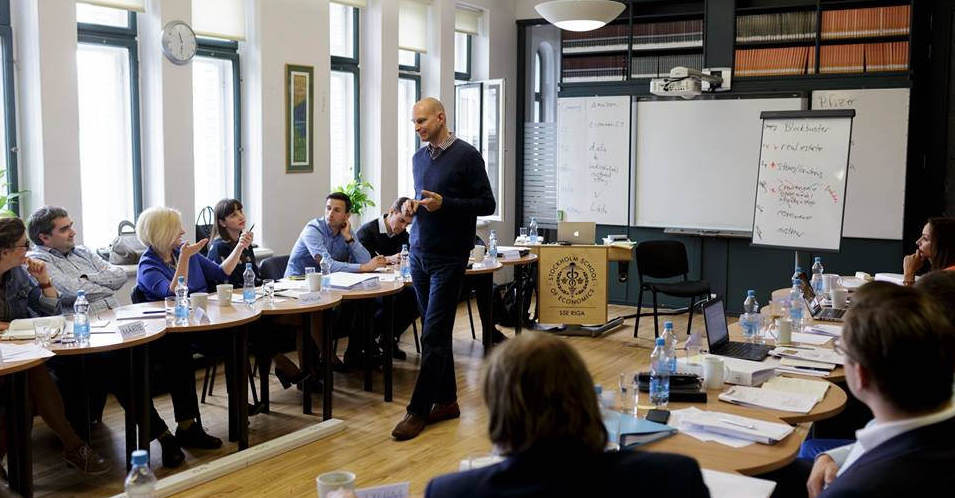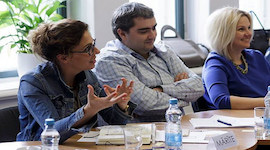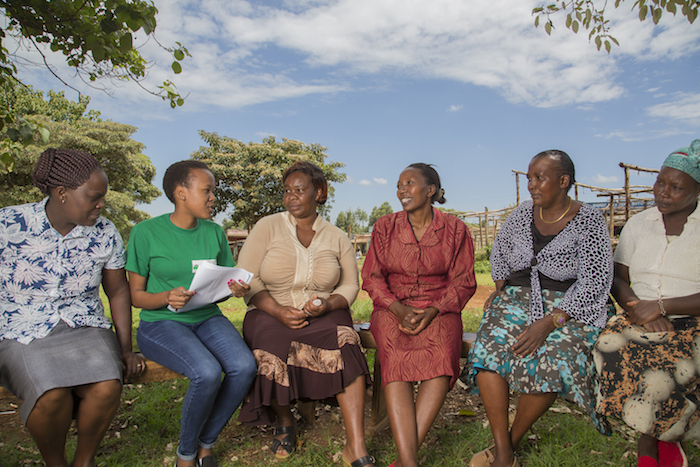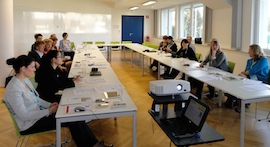 WDI’s executive education programs, delivered in partnership with the Stockholm School of Economics (SSE) in Riga, are attracting more international participants, bringing diverse opinions to the classroom and thereby adding value to the programs.
WDI’s executive education programs, delivered in partnership with the Stockholm School of Economics (SSE) in Riga, are attracting more international participants, bringing diverse opinions to the classroom and thereby adding value to the programs.
In past years, participants in the executive education offerings from WDI’s Education initiative at SSE Riga are citizens of host country Latvia and one or two neighboring Baltic countries. But for this year’s spring programs – the flagship, 10-day Strategic Management Program (SMP), Supply Chain and Logistics Management and Advanced Negotiations – drew participants not only from Latvia but also Russia, Chile, Estonia, Lithuania, Germany, Ukraine and even from as far away as Canada.
Santa Zeidaka, program manager at SSE Riga, said a key selling point is that its offerings are highly ranked in the Nordic and Baltic regions. She also said SSE Riga leverages its alumni network to spread the word on its programs and promotes them at conferences and on social media.
Zeidaka said a more international classroom benefits all the participants.
“Having an international group helps people open up more,” she said. “Participants get to see the problems from more diverse perspectives and this pushes participants to open their minds more, which is valuable when people work in international companies.”
For the popu lar SMP – also known as a “mini MBA” – participants came from Latvia, Lithuania, Ukraine and Canada. The program, tailored for high potential, mid- to senior-level managers, features four modules – strategy, finance, marketing, and leadership – and is structured around an integrative strategic framework. The program, held in May, combines lectures, discussions, cases and exercises. Participants also conduct group work, which enhances their critical thinking, decision-making and teamwork skills.
lar SMP – also known as a “mini MBA” – participants came from Latvia, Lithuania, Ukraine and Canada. The program, tailored for high potential, mid- to senior-level managers, features four modules – strategy, finance, marketing, and leadership – and is structured around an integrative strategic framework. The program, held in May, combines lectures, discussions, cases and exercises. Participants also conduct group work, which enhances their critical thinking, decision-making and teamwork skills.
Amy Gillett, vice president of WDI’s Education Initiative, said the fact that the SMP drew participants from four countries speaks to its strong reputation. She said participants around the world are recognizing the great value of this program.
“The Strategic Management Program is greatly enriched by having such a global audience,” she said. “Since the program is highly interactive with participants sharing their experiences, these diverse viewpoints spark new ideas and connections. Next year, we expect to attract participants from even more countries.”
This article traces the development of management education in Central and Eastern Europe over the past 30 years and provide recommendations for the future of management education in this part of the world. The authors, Danica Purg and Alenka Braček Lalić of IEDC-Bled School of Management, identify emerging business issues in Central and Eastern Europe and the resulting opportunities for institutions in the region to respond to these challenges with appropriate management and leadership development.
This article is part of the 25 Years of Market-Based Solutions article series released in honor of the William Davidson Institute’s 25th anniversary. Since its founding in 1992, the Education Initiative at the William Davidson Institute has helped management education institutions around the world develop their capacity. We look forward to continuing this work — and sharing key learnings — over the coming decades.

A Juhudi Kilimo representative speaks with smallholder farmers. The organization is the subject of one of the case writing entries for WDI’s case writing competition. (Image credit: Juhudi Kilimo)
WDI Publishing received 50 entries from 11 countries for its case writing competition, which is being held to commemorate WDI’s 25th anniversary and its years of work developing private sector solutions in low- and middle-income countries. Completed case studies, and accompanying teaching notes, must be submitted by Dec. 8 and the winners will be announced March 15, 2018.
Of the 50 entries, 41 are faculty and nine are student authors. Three authors entered more than one case, and 12 entries came from faculty members in the Philippines who were trained in case writing by WDI as part of its work on the STRIDE project.
Eleven universities in India are represented in the competition, nine from the Philippines and eight from the United States, including four from the University of Michigan’s Ross School of Business. Other countries represented in the competition are Australia, Canada, Kenya, Russia, Singapore, Switzerland, Ukraine and the United Kingdom.
Case study topics must describe a dilemma or challenge faced by a company or organization related to creating, implementing, evaluating, and/or disseminating market-based solutions in developing countries.
The proposed case studies are set in 17 different countries, including Angola, China, Estonia, Greece, Honduras, Kyrgyzstan, Mexico and the United Arab Emirates.
Some of the organizations and companies featured in the proposed cases include Just Us! Coffee Roasters Co-op, Solar Ear, Tallinna Kaubamaja, Digital Empowerment Foundation, SafeMotos, Juhudi Kilimo and SMART Diaphragm.
“I’m very excited and pleased by the global interest in our competition as evidenced by the demographics of our entrants,” said Sandy Draheim, manager of WDI Publishing. “And the relevance of the proposed case study topics and featured organizations align very well with WDI’s mission and focus. We are truly looking forward to the opportunity to publish and disseminate teaching cases about market-based solutions in developing countries.”
The competition, organized and administered by WDI Publishing was open to individual students or student teams, as long as they entered in collaboration with a faculty member from a degree-granting university or college. Faculty or faculty teams also could enter as long as they were currently teaching at a degree granting university or college.
The first place team or individual will win $3,500. The second place team or individual will win $2,500, and $1,000 will be awarded for third place. Additionally, each winning case will be professionally published by WDI Publishing.
Judges for the competition are: Kim Bettcher, senior knowledge manager at the Center for International Private Enterprise; John Branch, clinical assistant professor of business administration at the University of Michigan’s Ross School of Business; Gautam Kaul, professor of finance and the Fred M. Taylor Professor of Business Administration at Michigan Ross; and, Jordan Siegel, associate professor of corporate strategy at Michigan Ross.
WDI Publishing has organized and administered past case writing competitions. From 2011-2015, NextBillion, an affiliate of WDI, and NextBillion partner Citi Foundation sponsored competitions for the best-written case studies about business strategies aimed at alleviating poverty – especially at the economic base of the pyramid.
WDI’s Education Initiative is celebrating the 10th anniversary of its popular, intensive two-week Strategic Management Program – also known as a “mini-MBA” – at the Stockholm School of Economics in Riga, Latvia (SSE Riga).

The program, tailored for high potential, mid- to senior-level managers, begins today (May 9). But before the 21 participants arrive in Riga, they will have taken part in two e-learning modules on competition and finance, custom-designed for this program by WDI.
“The e-learning modules give an excellent overview on finance and competition, and get the participants thinking about strategic issues at their organizations before they arrive,” said Amy Gillett, Vice President of WDI’s Education Initiative. “The online modules also allow participants to learn as their schedule permits, and we can provide them more content without more time away from work.”
The Strategic Management Program (SMP) features four modules – strategy, finance, marketing, and leadership – and is structured around an integrative strategic framework. The sessions present both foundational general management principles and the recent business management theory.
Additionally, participants from Fortune 500 companies, small businesses, and nonprofits grapple with real situations faced by their peers in their own business environments.
The program combines lectures, discussions, cases, and exercises. Participants also conduct group work, which enhances their critical thinking, decision-making, and teamwork skills.
WDI has organized the program annually since 2007 in cooperation with SSE Riga. Past participants have come from Latvia, Estonia, Vietnam, Russia, and Lithuania. The program is conducted in English.
Three of the participants – from Lithuania, Estonia, and Latvia – are attending the program free of charge as WDI Teeter Scholars, named in memory of Robert M. Teeter, an advisor to U.S. presidents from 1968-1992 and a WDI board member. Through the scholarship program, WDI awards 20 full-tuition scholarships annually to managers from small- and medium-sized enterprises and NGOs in emerging markets to attend WDI Professional Education programs.
“The Strategic Management Program features leading faculty delivering the latest cutting-edge tools to managers, and providing them new ideas and strategies that they can apply at their organizations,” Gillett said.
This year’s SMP faculty include: